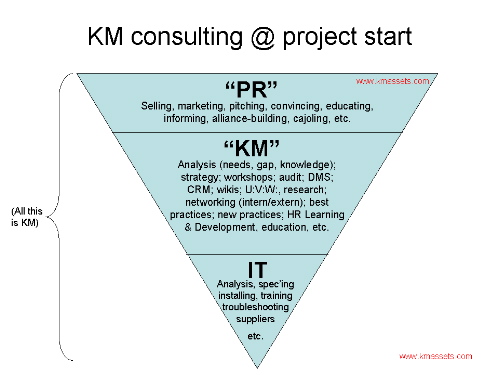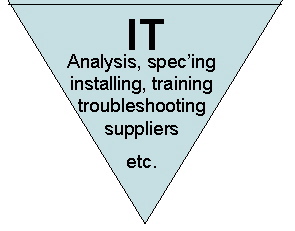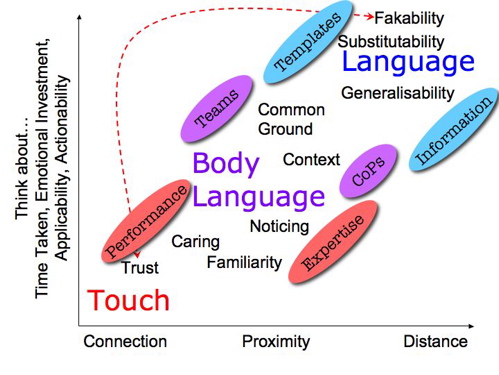Apr 04
Welcome to Wai Kong
We’ve been joined at Straits Knowledge by Ng Wai Kong, who will be managing our office, workshop logistics and lots more besides! Wai Kong has come to us from the book trade but his heart lies in good food and wine. I’m sure there’s more connection between gastronomy and KM than immediately comes to mind… Welcome!

Apr 03
On Knowing Email’s Place and an Opportunity in RSS
Matt Moore has a very elegant slideshare summarising email’s relationship to other social software tools, and in the process showing very nicely how email fits within the broader frame of the basic functions of communication, collaboration and notification. And like a true maestro he leaves us with a loose end to chew on… Go on, take a look.
Do you see the same thing I see? His section on notification seems incomplete. The slide on RSS is definitely unfinished, and his nice two-by-twos for communication and collaboration left me chewing all night. I realised that the main reason Matt’s notification section seems unfinished is that the technology is still immature, as demonstrated in the following play on Matt’s matricksy approach (venture capitalists rush for the door). Matrices are such clever things for showing us where things are missing. Matt, please forgive this humble palimpsest replacing your Notification section. Kind viewers, do look at Matt’s presentation first to see how this cut of slides fits in. (Thanks to Maish for the Pageflakes reference).
Apr 02
Snake Oil

Mike Poole in Hong Kong has taken a pot shot at KM as a “snake oil” solution and as a scam in the wake of the recent HKKMS/HKPolyU KM conference (I wonder who said what to raise such an ire?).
I’d be the first to welcome a good solid challenge to KM’s status – I believe it needs constant, sustained and sharp critique if it is to develop, and some of that critique may pose fundamental challenges to its legitimacy – which KM must overcome if it is to survive in any meaningful and productive form. Probably the best such critique on record is TD Wilson’s 2002 paper upon which Poole relies heavily ’The Nonsense of ‘Knowledge Management‘.
But Mike Poole’s shot looks to me like a cheap one, and seems to have no substantive reasoning behind it, relying on ambiguity about what KM means and a very crude distinction between tacit knowledge and explicit information to make his case. It’s also a pretty common cheap shot – check Google to see. So what’s the real argument here?
Mar 27
Toolkits Galore
We’re currently working on a Toolkit of knowledge sharing techniques – it’ll comprise a resource guide, accompanied by a training programme in those techniques. So imagine my delight on coming across Ben Ramalingam’s Tools for Knowledge and Learning: A guide for development and humanitarian organisations. Ben’s toolkit is not just applicable in development contexts, it could be adated for pretty much any organisational context, and I heartily recommend it. Ours is more focused on knowledge transfer and knowledge sharing where Ben’s is a range of approaches for getting KM and learning initiatives under way – but the basic idea is the same. To quote Ben:
“Many of these tools are simple and trying them out requires nothing more than the desire to try something new, and the drive to ‘get on and do it’. Undertaking them effectively requires effective – sometimes advanced – facilitation and communication skills. Here, we have aimed to provide comprehensive accounts of how to apply such techniques, with a focus on the requirements of potential facilitators.
Other tools covered here are more complex, and call for significant planning and resources if they are to be delivered effectively. Here, we have attempted to provide an introduction and orientation to a broad subject, as well as suggestions for further resources that might prove useful for the reader.”
Thanks to Daan Boom via Stan Garfield for this.
While on the topic of toolkits, Stan also has a great collection of resource links on Change Management this week (and it’s his birthday today – Happy Birthday!).
And we couldn’t fail to mention the UK’s NHS Knowledge Management Specialist Library, with a wide range of guides and resources.
Mar 27
Client Archetypes
Archetypes are in the air... So head on over to Speak Up, a designer community blog, where Jason Tselentis has published a “taxonomy of clients”. It’s more of a typology than a taxonomy, and if it had some artwork would rival Mike Reed’s Flame Warriors. Read the comments for some wonderful additions from the community, who basically read the post and got into deep bitching mode. My personal favourite is The Justifier:
“They are often in middle-management at their companies, and act as a go-between you and the true client, who is often either the CEO or VP of marketing. Their (your) work has to be approved by at least one boss above them, who, in turn, must have it approved by the actual client. They realize that their job is virtually meaningless and trivial, and that their ideas don’t matter. To counter that, they scrutinize the tiniest details of your work to grasp some sort of power over the project. Attributes: flip-flops, takes forever to approve things, has a degree in business. Known for saying: Let me run this by the team and Can you move that trademark symbol just a hair lower?”
Mar 24
Getting the KM Sequence Right
I like this inverted pyramid from Colman McMahon on how to approach a KM project. I’m not completely convinced that quite so much upfront PR and selling is good for KM. You do need some, but I think some of the diagnostic activities such as knowledge audits if done well can sell KM much better than any persuasive Powerpoints can. And to my mind the PR continues throughout the process. However, Colman’s basic idea is spot on. (See the original here).

Sigh… should be common sense after over a decade of getting it wrong, shouldn’t it? But last week, I saw a Singapore public sector tender that looked like the pyramid below, with no mention of any prior work. Either they had done the work but didn’t think it was relevant to potential tenderers, or they just hadn’t done it. More taxpayer’s money down the tubes (some of it is mine). You know who you are.

Mar 20
Touched
A few weeks ago I wrote a post about touch which generated a few comments on my blog, and posts elsewhere from Matt, Johnnie, Brad, David that I know of. I was suggesting that touch – physical touch – was something we should consider more when talking about knowledge management (and actually I was thinking about knowledge sharing and knowledge transfer in particular). I was intrigued at the reactions – people either seemed to like the idea or dislike it. Brad Hinton pointed out that “touch is a touchy subject” and he’s quite right. Johnnie Moore suggested it was an elephant in the room that needed to be talked about.
So we talked about it yesterday, Johnnie, Mark Earls and me. Here’s Johnnie’s post with the podcast and a great time-tagged summary of our conversation. And a link to an earlier related article I wrote some time back on “The Autism of Knowledge Management”.
Why do I think this is important for knowledge management? I’m not completely sure yet, but I have a very strong feeling that we need to examine much more closely the notion of knowledge as embodied and human. So I’m playing around with some representations, of which this is one. Notice where the really difficult stuff is with high stakes attached (performance, expertise) and where the majority of our effort is typically devoted? Any wonder why KM is not taken seriously in so many places?

Mar 20
Health Warning: Archetypes Abroad!
Graham Durant-Law has been mounting an aggressive campaign against archetypes, resulting in a detailed exchange with him on his weblog this past few days, to the point where I think his position is against an overly simplistic use of archetypes, with plenty of health warnings attached. I’ve found the discussion useful (go visit his blog post to see it), as well as some comments from Mark Gould, who warns against the use of archetypes for labelling and as a substitute for engaging directly with people.
So some of the health warnings I get from the discussion are:
- Risk of labelling and stereotyping
- Applying the archetypes to contexts they don’t represent
- Over-estimating the extent to which they are a legitimate representation of the population
- Treating them as universals (or as permanent)
- Simplistic interpretations by people who may not share the context they come from
Mar 19
Asking and Answering
Via Mark Schenk this very clean account on video of how communities of practice work at Rio Tinto. It’s a nice video to use as a simple explanation of the benefits that CoPs can bring (if it was easy to download it, that is.. I scraped a copy of it using free screencasting software iShowU). It sensibly zeros in on a single story, of how a bulldozer in Australia got fixed with help from operations in the US. The benefits are not just touted as financial… towards the end of the video Rio Tinto’s Energy CEO Preston Chiaro talks about the culture change the communities have brought about – with people more willing to ask and answer important questions.
What I’d like to see more of is some of the stories about resistance and challenges overcome in establishing the communities and breaching the “I gotta fix it myself, it’s a matter of professional pride” that technical and engineering organisations often have. And make videos downloadable if you want your message to spread! Thanks, Mark.

Mar 19
The Difference Between Experience and Expert Performance
A fantastic post from Kim Sbarcea on why experience doesn’t necessarily help you perform any better, based on a Time Magazine article. It turns out performance comes from hard, reflective practice, pushing at the edges of their ability. This chimes with a theme in Richard Sennett’s new book The Craftsman, which I’ve just started:
“The good craftsman, moreover, uses solutions to uncover new territory; problem solving and problem finding are intimately related in his or her mind.”

